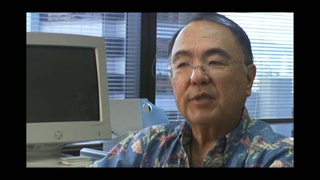Interviews
Idealism before war, being red, white and blue
I was so ‘Red, White and Blue,’ so small-town gal, you know, and just really a thorough American, I mean, I’ve changed almost all the way around. But, then, I mean here, you know, teaching Sunday school and this whole thing about being a proud American, and I guess I was. Now, I’m certainly not, I mean. But, then, I mean, I just thought America was such a wonderful country that there could not be any country where people could be so free and no racism... I didn’t realize how bad racism was because in the school world, it’s so different from the working world, you know. And everybody was so nice, I mean, I loved, you know, living there with all the Italians and Slavonians and there were Scots and French and German...everybody. And so, it seemed like a perfect place to grow up.
Date: June 16, 2003
Location: California, US
Interviewer: Karen Ishizuka, Akira Boch
Contributed by: Watase Media Arts Center, Japanese American National Museum.










